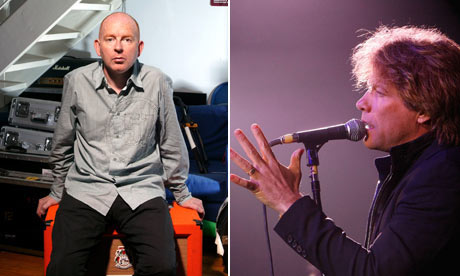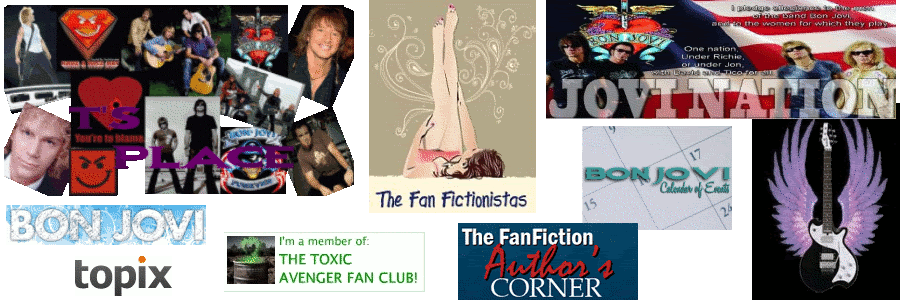Alan McGee meets Jon Bon Jovi
Thanks, Kiwi, for the drop in the ol' GoddessMail inbox!!

Who's the last person you might expect to be a dedicated Bon Jovi fan? How about someone who, while Bon Jovi were conquering the world's charts in the 1980s and 90s, was releasing records of guitar noise on an indie label he'd set up with an enterprise allowance grant? Someone who's known for the evangelical fervour with which he describes punk rock's effects on him? That would be Alan McGee, the former head of Creation records, mentor to Oasis, the Jesus and Mary Chain, My Bloody Valentine and Primal Scream. Earlier this year, he blogged at guardian.co.uk/music about his love for Bon Jovi. Titled Why Bon Jovi are Mythic New Jersey Artists, it passionately defended the band against those who deride them as pedestrian arena rockers. So, why not put McGee and Jon Bon Jovi, singer and leader of the group that bears his name, together – and see whether the men who gave us, respectively, Livin' on a Prayer and the Pastels' A Million Tears can find any common ground …
Alan McGee: I've spent a lot of time in America, and I don't think a lot of Brits get the scene you come out of. I don't think people here understand how much goodwill there is toward Bon Jovi in America. You were brought up in a blue-collar neighbourhood. How much personal drive do you feel comes from your own working-class roots?
Jon Bon Jovi: A fair amount. It's a work ethic. We didn't have the LA style-over-substance thing, or the big-city glamour that you get caught up in, where you're caught up in press stories about who's scoring the best drugs in town. A lot of the media love to report on the best gossip stories, but you won't get that from my band. Either we didn't do it or we didn't tell anyone! That kid from Babyshambles, I've never, ever heard of him. People say, "Isn't he great? He's such a rock star?" But that's all people know about him, that he's a great rock star.
AM: Speaking of drive, have you seen the movie Anvil [the documentary about a perennial-loser metal band] that's currently making the rounds? The documentary is interesting, highlighting their rise and fall and their drive to keep making rock'n'roll.
JBJ: I loved it, really did love it. I think I'm one of the four people in the world who knew who they were. They show a shot of a Japanese show, and they were the opening band and we were the next one up at that show. It was us, them and Whitesnake and Michael Schenker and the Scorpions. What I loved most about it was everything the guy said was with a smile – he just loves to play the guitar. After the documentary, they didn't get big, they got to open for AC/DC around here.
AM: You played the Asbury Park club circuit as a teenager. Do you think those stomping grounds informed your present-day live act? What did you learn from the Asbury Park circuit?
JBJ: We didn't play the Stone Pony [the club associated with Bruce Springsteen], 'cos that was more for cover bands, but there was a place called the Fast Lane, and what we learned was to be an original band. It was a one-for-all, all-for-one attitude there. There were four bands playing originals [each night], and if you needed help, they were always around. You learned really early on that it was important to play your own stuff.
AM: Have you seen The Wrestler? There was an interesting musical point made when Mickey Rourke implied he missed the good time rock'n'roll of Ratt, and how grunge killed the party. What were your own reactions to Nirvana, et al? Did you dig it?
JBJ: Oh, yeah, immensely. It was the healthiest thing that could've happened. [Hard rock had become] like any genre of music that gets so big that record executives sign 10 bands that sound like bands that are already successful. Guns N' Roses and us and three or four other bands were doing well, and then they signed a lot of shite, and then Kurt Cobain came along and cleared out all the shite. But then the record companies went and signed 10 Nirvanas! Every genre has its successes, and then they eat their own young.
AM: You are one of the few bands from the 80s who circumvented grunge and still remained popular without becoming a nostalgia act. Do you ever think, "Wow, we were lucky"? And how did you maintain your profile when others faltered?
JBJ: We remained lucky because we work hard, and we had established roots in Asia, Africa, Australia and America. A lot of bands didn't do the whole world, and when America turned its backs on them, they lost everything. But when America turned its back on us, we just went to Asia and Australia, and when America came back, we were cool with that.
AM: Peter Buck said that, before starting REM, he read every biography to avoid every cause for a band breaking up. How have you kept Bon Jovi going for 25 years with only the loss of the bass player?
JBJ: Ultimately, the guys like each other. Richie [Sambora, guitarist] and I get along and we really are great friends and fans of each other. I make sure we give credit where credit is due. If Richie shows up and is great on a record I make sure people know it. It's not all me, me, me, me, me.
AM: You seem to have a team mentality.
JBJ: Bono needs The Edge, Plant would've needed Page, Mick needs Keith, Keith needs Mick.
AM: In your key song, Livin' on a Prayer, there has been discussion and controversy about whether the Tommy character was a strike-breaker. Any thoughts?
JBJ: No, no, Christ, no. He just lost his job – it wasn't that he crossed the [picket] line. The industry left the town and he didn't get the job back. It was a fictional character. The inspiration was a young couple who got pregnant and gave up everything they had, but that didn't read right, so we changed the story.
AM: You participated in American Idol. What are your feelings about people using reality TV to propel themselves to musical fame? Do you feel instant success without the groundwork is not sustainable, considering the groundwork you put into your own career? Or do you feel musical culture has changed and American Idol reflects the attention-deficit-disorder style of present day music?
JBJ: What happened when we got a record deal was that you were given several albums to develop a style and build a fanbase and earn your keep. If you floundered the first one or two, chances are you would still get the third one. These kids come off an Idol or an X Factor and they're expected to be competitive with the biggest stars of the day. Even if they have a one- or five-year career, it might be hard for them to have a 25-year career. Where's the world going to find the next Bob Dylan? People will say he's not pretty enough or doesn't sing pretty enough.
AM: What is the secret of Bon Jovi's success?
JBJ: I think one of the secrets to the band's success is our respect for [the songwriting of] the Dylans and Van Morrisons and Springsteens and the showmanship of the Van Halens and the singing chops and ability to play of the Journeys and the Raspberries. That cross-pollination made us unique. It was little bits of all those things and not being so narrow-minded as to say that if it's not one thing, it's not valid. That's probably the secret.
AM: Your new album is a return to the subject matter of Livin' on a Prayer – more anthems for economic hard times. What are you trying to achieve with it?
JBJ: We said some things I'm very proud of. The themes were based on what was happening in the world. When you read into the lyrics of Can We Be Happy Now, that's our president getting elected; when you hear Bullet, that was about Jennifer Hudson's family getting shot on that Sunday morning. The stories you read in the lyrics are all true. People are waiting to tear the president down – they built him up and now they want to tear him down. We Weren't Born to Follow has a universal and timeless theme: we were asked to come to the anniversary of the Berlin Wall, the only band invited to it with all the world leaders. I was in Berlin when it came down, and 20 years later to be the only band asked to come and perform at the ceremony is an honour.
Now, strictly speaking, I don't think JonBon and crew were "asked". I believe I read that they sent a "hey, can we come play" letter and the Germans said "sure". Not quite the same thing.
Still a very cool thing. A VERY cool thing.
And I have to say, the mention of the Jesus and Mary Chain? Totally bringing me back to college, when worked at the campus' alternative radio station. JMC was a huge hit.
~ Hath
source

















0 comments:
Post a Comment